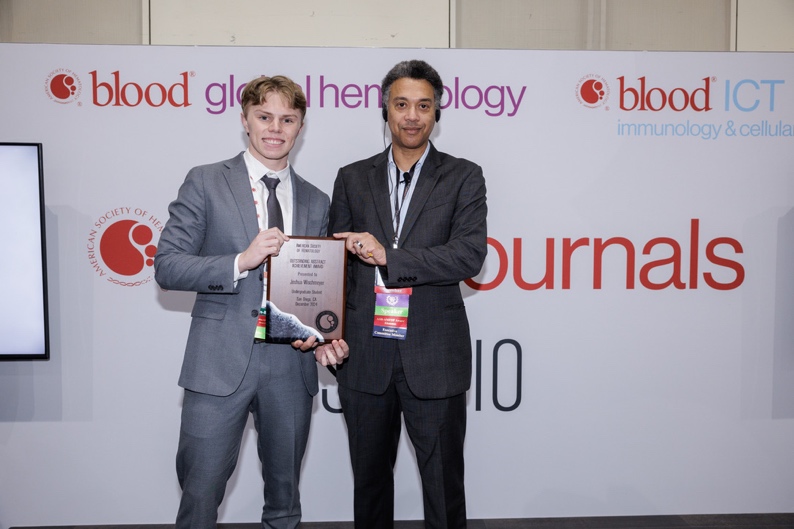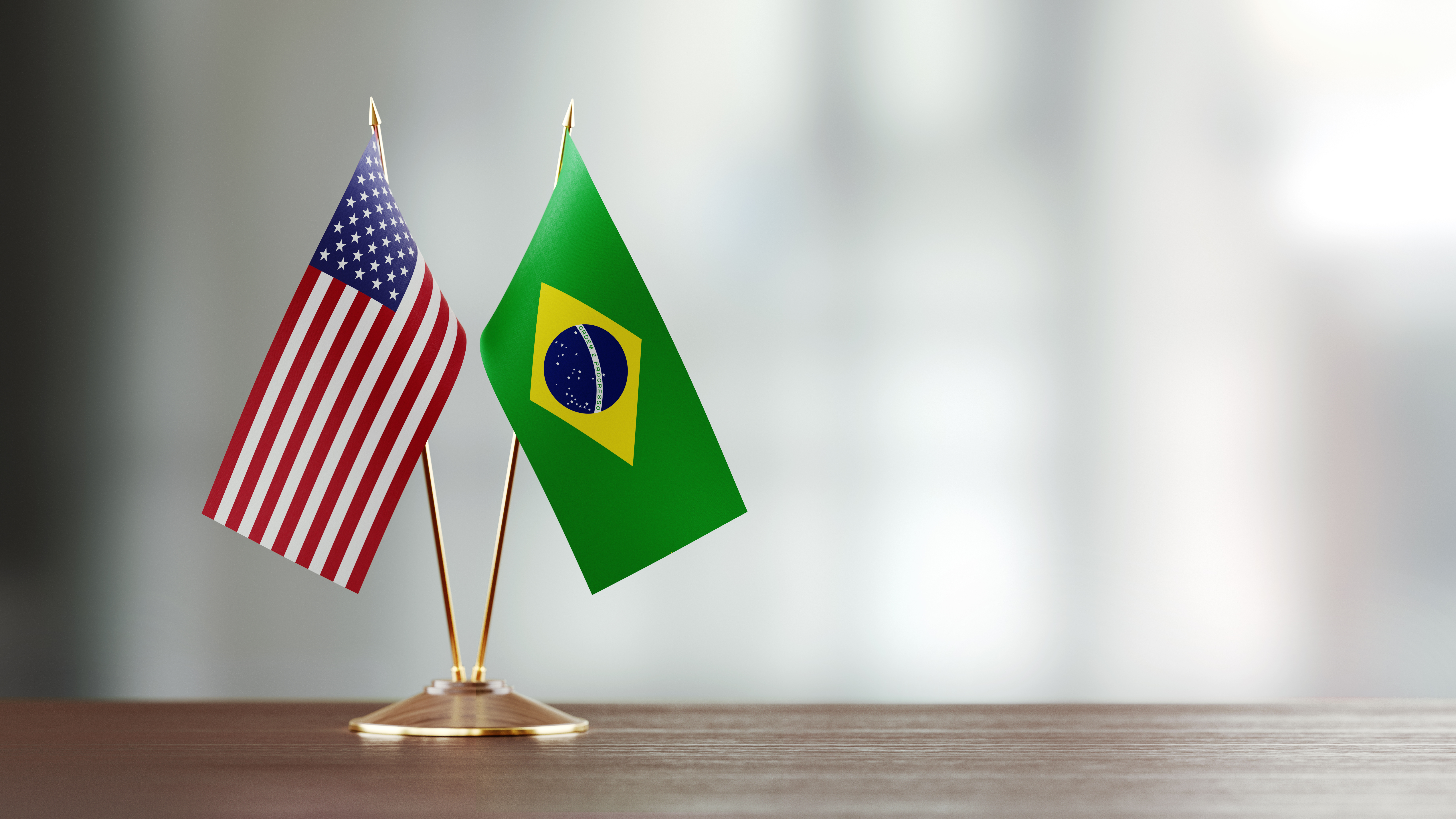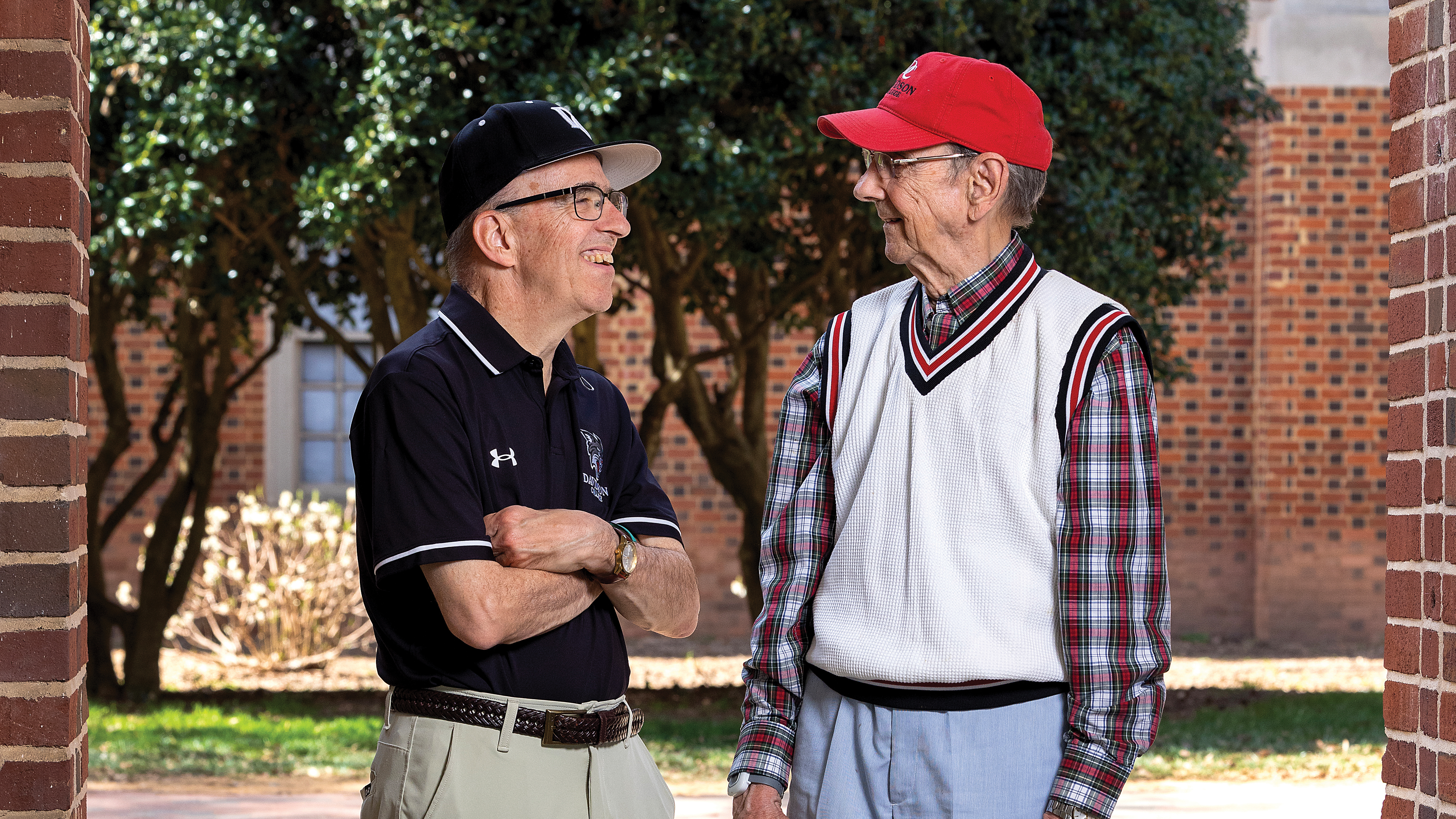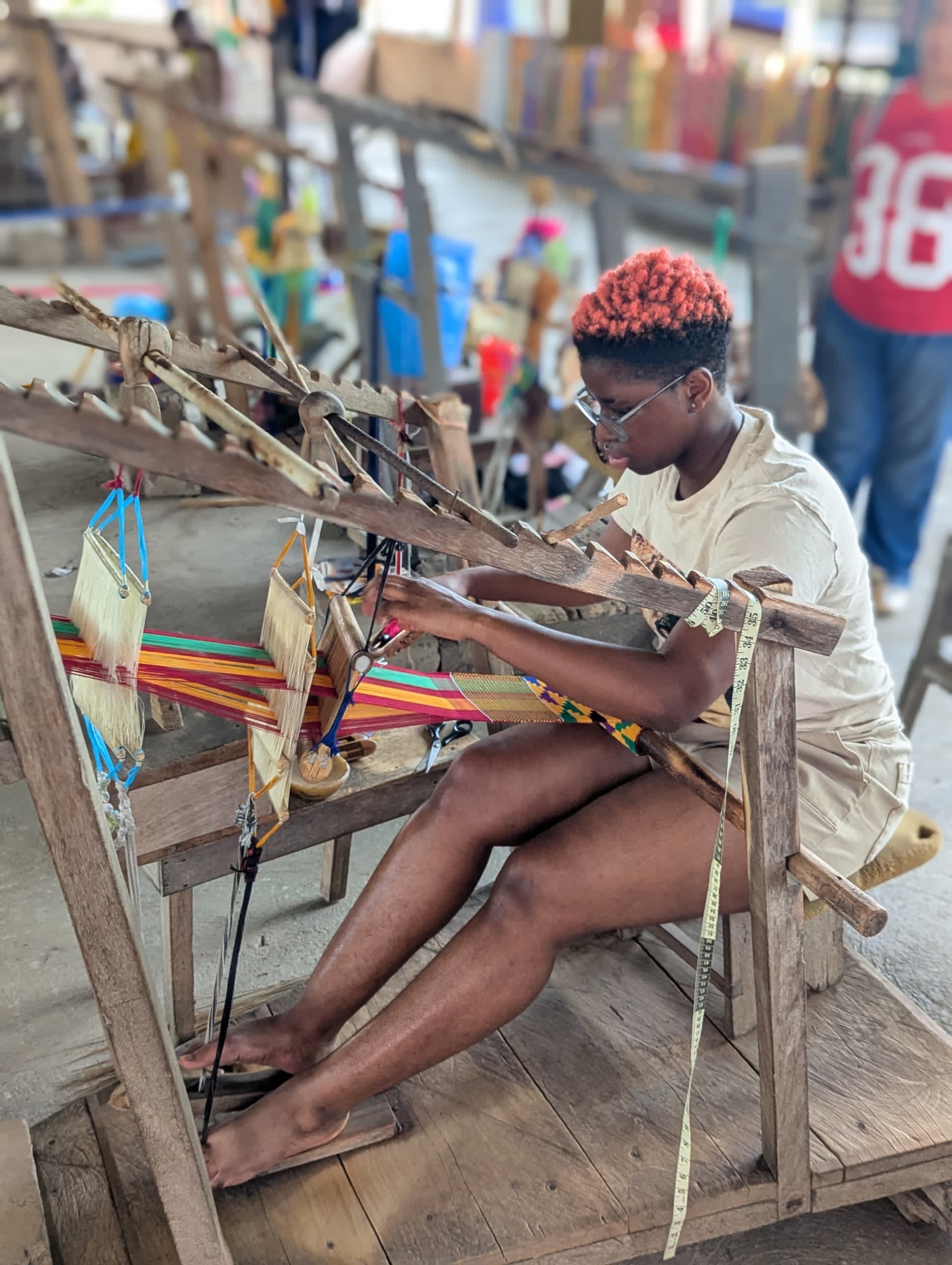On Veterans Day, a Family’s Legacy of Service and a Veteran’s Mission to Help Others Heal
November 11, 2019
- Author
- Mary Elizabeth DeAngelis
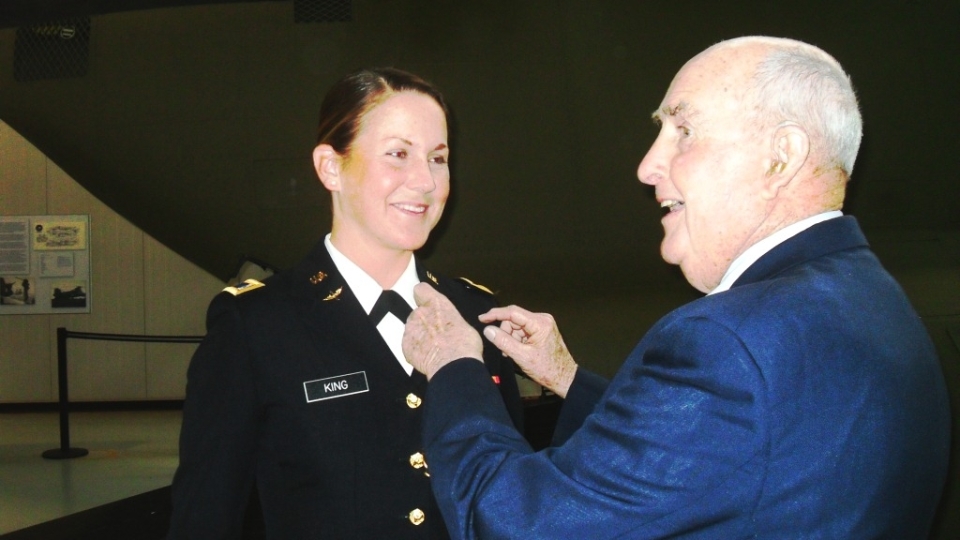
Alumnus Retired Air Force Brigadier General John Rose pins aviator wings on granddaughter Emily King at her 2013 graduation from flight school at Fort Rucker, Alabama.
On Sept. 11, 2001, U.S. Army COL. Robert Lutz was practicing parachute jumps at a lake near Fort Bragg when the helicopter sent to pick his team up flew away instead. As they wondered why, a man ran out of a nearby house and told them that airplanes had just flown into the World Trade Center.
A few miles away, ninth-grader Emily King and her classmates hovered around television sets at Terry Sanford High School, where the day’s lessons came down to one: The United States had been attacked.
Al Qaeda terrorists hijacked four passenger airplanes and flew them into the World Trade Center’s twin towers, the Pentagon and a field in Pennsylvania. Nearly 3,000 people died and a shocked, shaken nation mourned.
Lutz’s Special Operations team made it back to a locked-down Fort Bragg and prepared for the inevitable. On Oct. 7, the first troops deployed for the invasion of Afghanistan, targeting the Taliban regime that supported the terrorists.
Eighteen years later, the global war on terror continues. Nearly 7,000 American soldiers have died. More than 52,000 have been wounded.
On this Veteran’s Day we pause to honor them and all who have served in our Armed Forces— in war and peace—and all who still serve.
Ongoing Toll
This current war is the longest conflict in U.S. history. So long, and so far away, that a 2018 poll of likely voters showed 42 percent didn’t think, or weren’t sure, the country was at war.
It’s all too certain for those who serve, and those who love them.
Army Major David Taylor, from Davidson College’s class of 1991, died in 2006 when a roadside bomb detonated near his vehicle during combat in Baghdad.
Navy Seal Josh Harris, from the class of 1994, died in 2008 leading a mission near the Afghanistan-Pakistan border.
King, a 2009 graduate, is among the 22,000 U.S. troops still in the region. The Army helicopter pilot flies troops, equipment and supplies through dangerous skies.
Lutz, from the class of 1987, is finally home after many deployments. He is Davidson’s athletic teams’ doctor and also helps veterans with post-traumatic stress disorder.
Americans who have never served in the military—the vast majority—may wonder what compels those who do.
The late David Taylor carried a picture of the team he supervised and another of his baby son, drawings of the American flag, and a handwritten copy of this quote from 19th century philosopher John Stuart Mill:
“War is an ugly thing, but not the ugliest of things: The decayed and degraded state of moral and patriotic feeling which thinks that nothing is worth war is much worse…The person who has nothing for which he is willing to fight, nothing which is more important than his own personal safety, is a miserable creature and has no chance of being free unless made and kept so by the exertions of better men than himself.”
Today, we share the stories of two Davidson alumni with a frontline perspective of the war our country still fights.
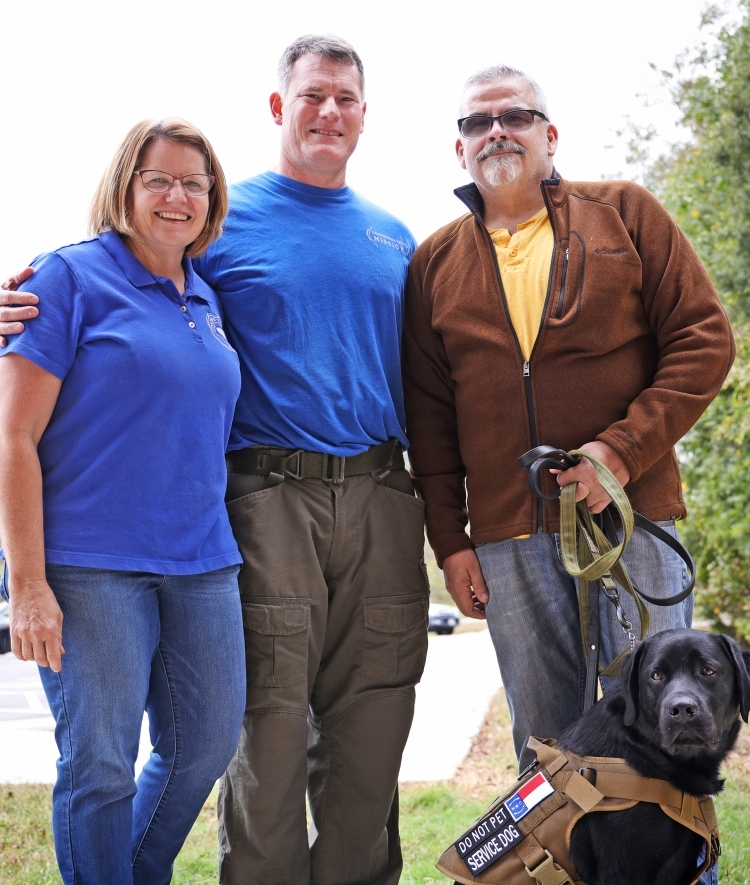
Suzy and Robert Lutz ’87 (left and center), of Continuing the Mission
Robert Lutz ’87: Healing Through ‘Continuing the Mission’
A week after returning from his first deployment to Afghanistan, Robert and Suzy Lutz took their young sons to Disney World.
In Afghanistan, he’d treated wounded and dying soldiers as bombs dropped around them. At Disney World, he saw crowds of carefree faces and wondered: “Do any of you have any idea what’s going on?”
Thirteen deployments later, Lutz still wonders. The retired Army Special Operations Medical Team leader was among the early waves of troops deployed during the invasion of Afghanistan. He fought to save soldiers with lost limbs, severe burns and fatal wounds, working largely on battlegrounds, not in hospitals.
Like the unit he led, many were redeployed over and over as the battles expanded to Iraq and Pakistan. Many came back with visible injuries, others, with wounded psyches.
Today, Lutz works with his wife, Suzy, to help veterans heal from their unseen injuries. They do it one soldier, one dog and a growing support community at a time.
Suzy Lutz founded “Continuing the Mission” in 2016 to help returning veterans with PTSD. Robert Lutz serves as medical director of the all-volunteer non-profit.
Soldiers returning home may find themselves in a society that doesn’t understand—and in some cases seems oblivious to—the ongoing war. Many have post-traumatic stress and, away from their fellow soldiers and a common mission, feel isolated.
Continuing the Mission pairs veterans with service dogs trained to recognize signs of distress; then offer a calming, loving response. The dogs provide cues so the veterans identify early warnings of panic, stress or depression and can look for healthy ways to cope.
Lutz thinks most veterans come home from combat with symptoms of post-traumatic stress that normally fade with time. But repeated deployments can change that. After his last deployment he filled out a PTSD questionnaire, thinking he was fine; he then talked to Suzy, who answered the questions differently.
“She put down that I never wanted to leave the house or my dog,” Lutz said. “That was a bit of a wakeup call.”
Lutz had spent most of his deployments providing emergency medical care to fellow soldiers. He’d been shot at, landed behind enemy lines, and spent two months under daily mortar attack. In retrospect, “I think it would be abnormal not to have some symptoms after what you experience in a war.”
He says time, counseling, and a strong family and friend support network helped him.
“Not everyone has that,” he said. “That’s why I encourage people to seek help when they need it, and to get involved in their community—especially through volunteer work.”

Continuing the Mission has paired six service dogs with North Carolina veterans. The dogs provide companionship and help mitigate the effects of post-traumatic stress.
Purpose and Companionship
Suzy Lutz began training dogs early into her husband’s military career. In a dog training class, she met a grieving young woman whose husband had died in combat. Her parents gave her a puppy to offer comfort.
“At first she was so withdrawn and reserved, and I watched her blossom into this beautiful, confident young woman,” Suzy Lutz said. “I thought, ‘If that little puppy can do that, I want to give that opportunity to someone else.’ And that’s how we got started.”
Suzy Lutz works with trainer Cortney Owens to prepare the dogs for their assignments. The dogs go through two years of training, with volunteers fostering them. They spend two eight-week stints at the Rutherford Correctional facility, where inmates train them as part of a program called New Leash on Life.
Veterans get screened for compatibility. Those chosen get to know the dogs before a final ceremony called Passing the Leash. Other veterans, foster families and trainers attend the ceremony to offer positive words and wishes.
Continuing the Mission has paired six service dogs with North Carolina veterans. They’ve trained more, but some dogs go through a career change if they’re not suited for a service post. In many cases, they find homes with other veterans and families of active duty soldiers.
A service dog isn’t a cure for the serious problems some veterans face, but can help provide a sense of purpose and companionship, and mitigate their symptoms of post-traumatic stress, the Lutzes say.
“Nobody experiences trauma and comes out unchanged,” Suzy Lutz said. “We’re trying to give people a place where they belong—where they’re part of a team. The results of our mission may seem small, but we try to touch as many people as we can.”

Chief Warrant Officer 3 Emily King ’09 aboard her Chinook helicopter in eastern Afghanistan
Emily King ’09: One Family’s Service and Sacrifice
Of all the places you’d expect an art major to land, Afghanistan, in a Chinook helicopter that she pilots, seems pretty unlikely.
But Emily King was born with service genes.
When Japanese bombers attacked Pearl Harbor in 1941, her grandfather, John Rose, and many of his Davidson College classmates dropped out to enlist in World War II. Rose became an Air Force fighter pilot and eventually a brigadier general. Between deployments, he returned to Davidson, finally receiving his degree in 1963. Rose and King’s other grandfather, Army COL. Francis King, both served in Vietnam.
Her father, Charlie King, was a career Army officer. Her brother, Ben, served as an Army Special Forces medic in Afghanistan. Her husband, Jean Gation, is in the Army’s Special Forces.
Emily King grew up on military bases. On Sept. 11, 2001, her family lived at Fort Bragg, in Fayetteville, North Carolina, where her dad was a Special Forces commander and instructor.
She remembers watching the TV news at school and the staff’s concern about how she and the other kids from military families would get home to the locked down base. Over the next few weeks, she sensed impending action as the military community prepared for war.
“I felt this calling, like I knew I could assist,” she said, “but I was too young to know what kind of role I would fill.”
She said her admiration for her grandfather steered her to Davidson, where she ran for the cross-country team and thought about becoming an architect. After graduation, she tried an art career, creating lithography and wood block prints, but didn’t see it as a viable future.
She joined the army in 2009, graduated from flight school in 2013, and is now assigned to the Colorado Army National Guard.
“I knew I wanted to be a helicopter pilot and fly Chinooks,” she said. “The Army made it easy for that to happen. It’s certainly not glamorous, but when I go out and do my job, I feel like I’m doing some good.”
As a National Guard pilot, she’s flown missions to rescue people from mudslides, dump water over raging wildfires, and drop bales of hay to stranded farm animals. Her crew rescued dogs from a shelter in Houston during Hurricane Harvey, and she ended up adopting one named Hurricane.
Somebody has to do it. It takes a certain type of person to be able to come back here, time and time again,” she said. “I’m capable of doing it, so I will continue to do it until we’re no longer needed.
She’s also a flight instructor.
“I think a lot people either want to follow in the family footsteps or do the exact opposite,” she said. “I’m fortunate, I grew up in a family with men and women I’m truly proud of. I wanted to do what they did.”
But being deployed by the army three times in six years into Middle Eastern combat zones carries special challenges. She knows her family worries, just as she does about her husband.
“I see the strain that it puts on families,” she said during a recent Facetime interview from Afghanistan. “As a spouse, when he’s deployed, there’s this fear that you have no control, that you can’t help them, and until they come back, you worry. Now I know how my mom feels.”
What is it that drives families like hers to serve?
“Somebody has to do it. It takes a certain type of person to be able to come back here, time and time again,” she said. “I’m capable of doing it, so I will continue to do it until we’re no longer needed.”
Her brother Ben, now a physician assistant, says this:
“We don’t really identify as soldiers, it just happens to be what our family did. It’s not all awful. When you plan a mission and it’s successful, that’s a good day—perhaps one of the best days you will ever experience. In contrast, you’ll never forget the day you have to treat one of your friends, and they die—that is hard to forget and will mark one of your worst days. You can’t forget those friends and the great times you shared together, though.”
Her grandfather says that sense of purpose—of fighting for a greater good—is what carried him and his generation through World War II.
“I told Emily that it’s a tough job and she had to be on the ball all the time when she was flying an aircraft, and she listened,” Rose said. “I’m very proud of Emily. There’s no better mission than serving in the military—you’re putting your life in harm’s way to protect others—nothing compares to that.”
But the general is also a grandfather counting the days until his beloved granddaughter returns.
“I’m looking forward to hugging her first,” he said, “then hearing her stories.”
America’s involvement in World War II lasted about four years and dominated the country’s attention. This much longer war, viewed by civilians through a much more fragmented media, commands far less awareness.
“You can’t fault them for not knowing, but people are still dying here—my family and I all have friends who died here. When you go to Arlington (National Cemetery) and see the names of your friends on graves,” King said softly, then paused.
“I’m still in the thick of it. Maybe the sting is less when you’re not so close.”
